Global Business Environment: A Case Study of SASOL Ltd.
VerifiedAdded on 2023/06/18
|11
|3857
|122
AI Summary
This report analyzes the global business environment of SASOL Ltd. using McKinsey's 7S model and Hofstede's cultural dimensions. It also evaluates ethical and sustainable factors, strategic decision making, and risk diversification in a global context.
Contribute Materials
Your contribution can guide someone’s learning journey. Share your
documents today.
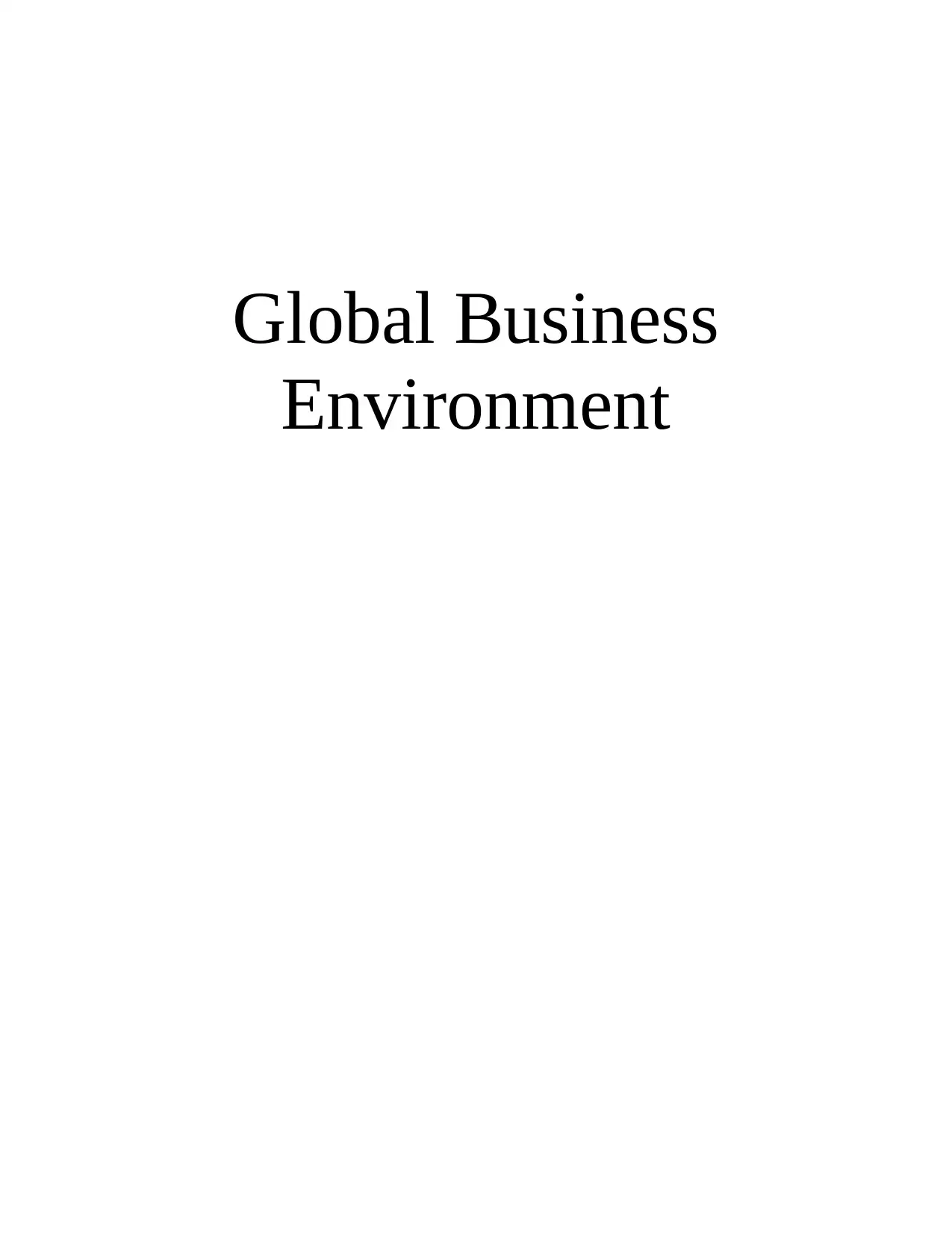
Global Business
Environment
Environment
Secure Best Marks with AI Grader
Need help grading? Try our AI Grader for instant feedback on your assignments.
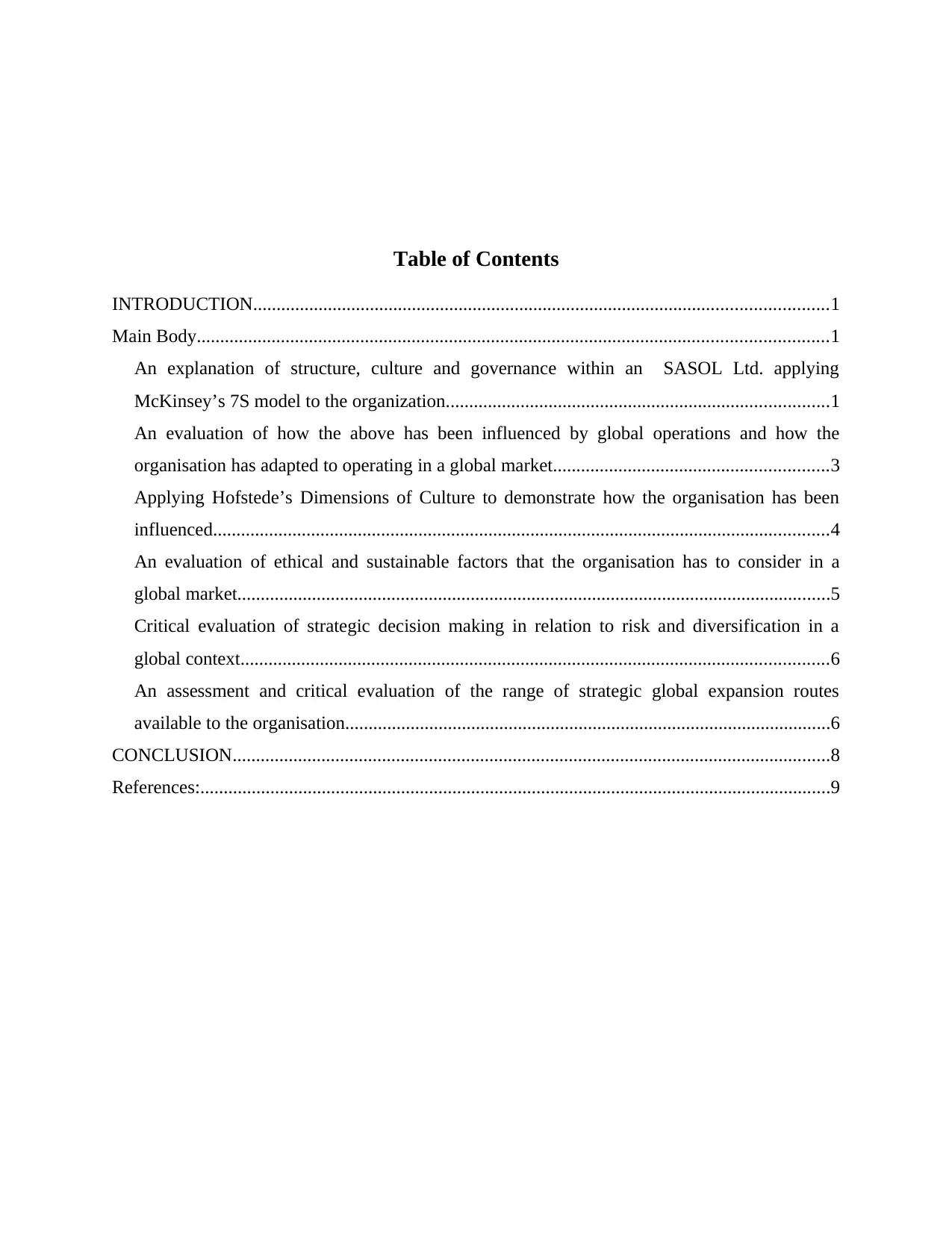
Table of Contents
INTRODUCTION...........................................................................................................................1
Main Body.......................................................................................................................................1
An explanation of structure, culture and governance within an SASOL Ltd. applying
McKinsey’s 7S model to the organization..................................................................................1
An evaluation of how the above has been influenced by global operations and how the
organisation has adapted to operating in a global market...........................................................3
Applying Hofstede’s Dimensions of Culture to demonstrate how the organisation has been
influenced....................................................................................................................................4
An evaluation of ethical and sustainable factors that the organisation has to consider in a
global market...............................................................................................................................5
Critical evaluation of strategic decision making in relation to risk and diversification in a
global context..............................................................................................................................6
An assessment and critical evaluation of the range of strategic global expansion routes
available to the organisation........................................................................................................6
CONCLUSION................................................................................................................................8
References:.......................................................................................................................................9
INTRODUCTION...........................................................................................................................1
Main Body.......................................................................................................................................1
An explanation of structure, culture and governance within an SASOL Ltd. applying
McKinsey’s 7S model to the organization..................................................................................1
An evaluation of how the above has been influenced by global operations and how the
organisation has adapted to operating in a global market...........................................................3
Applying Hofstede’s Dimensions of Culture to demonstrate how the organisation has been
influenced....................................................................................................................................4
An evaluation of ethical and sustainable factors that the organisation has to consider in a
global market...............................................................................................................................5
Critical evaluation of strategic decision making in relation to risk and diversification in a
global context..............................................................................................................................6
An assessment and critical evaluation of the range of strategic global expansion routes
available to the organisation........................................................................................................6
CONCLUSION................................................................................................................................8
References:.......................................................................................................................................9
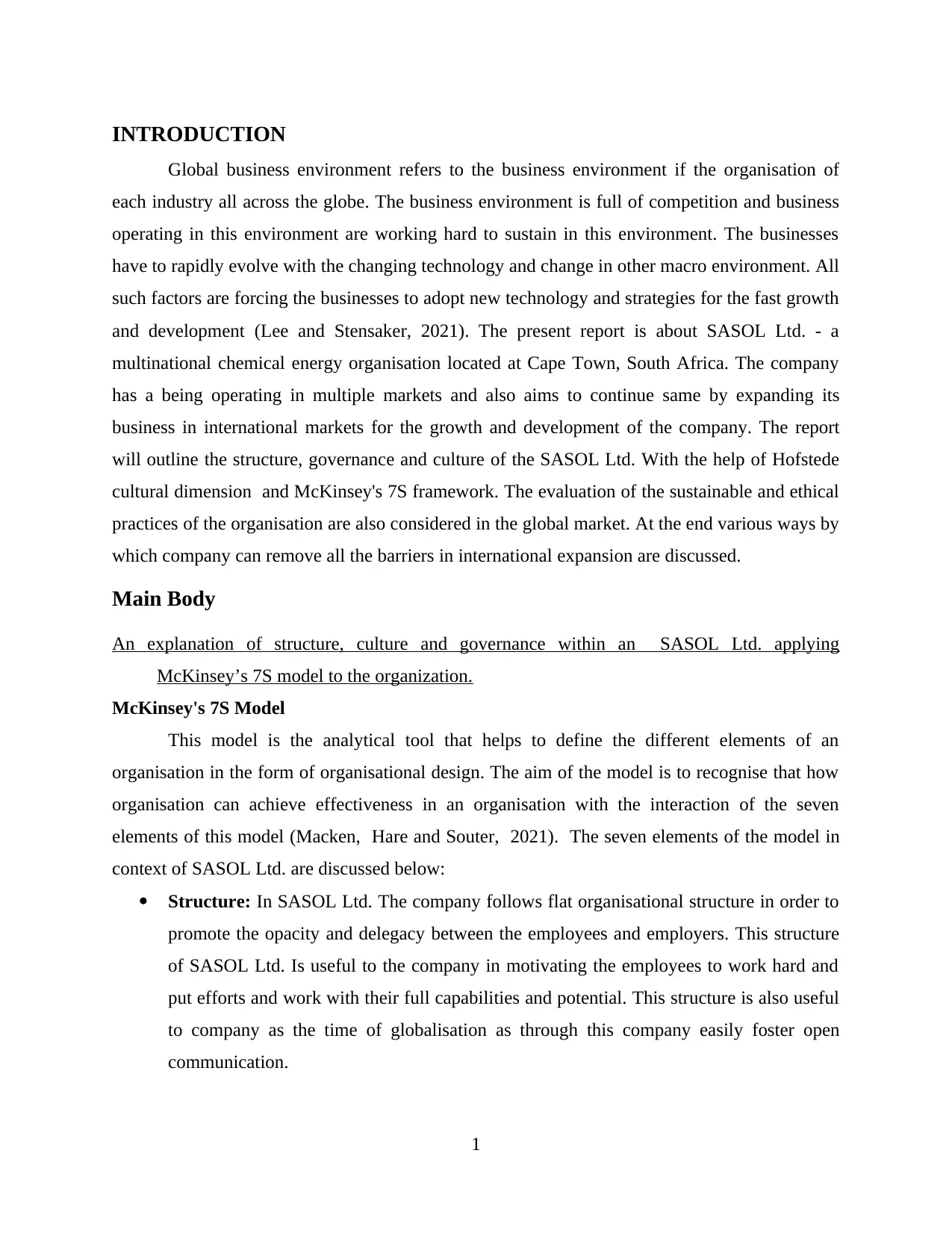
INTRODUCTION
Global business environment refers to the business environment if the organisation of
each industry all across the globe. The business environment is full of competition and business
operating in this environment are working hard to sustain in this environment. The businesses
have to rapidly evolve with the changing technology and change in other macro environment. All
such factors are forcing the businesses to adopt new technology and strategies for the fast growth
and development (Lee and Stensaker, 2021). The present report is about SASOL Ltd. - a
multinational chemical energy organisation located at Cape Town, South Africa. The company
has a being operating in multiple markets and also aims to continue same by expanding its
business in international markets for the growth and development of the company. The report
will outline the structure, governance and culture of the SASOL Ltd. With the help of Hofstede
cultural dimension and McKinsey's 7S framework. The evaluation of the sustainable and ethical
practices of the organisation are also considered in the global market. At the end various ways by
which company can remove all the barriers in international expansion are discussed.
Main Body
An explanation of structure, culture and governance within an SASOL Ltd. applying
McKinsey’s 7S model to the organization.
McKinsey's 7S Model
This model is the analytical tool that helps to define the different elements of an
organisation in the form of organisational design. The aim of the model is to recognise that how
organisation can achieve effectiveness in an organisation with the interaction of the seven
elements of this model (Macken, Hare and Souter, 2021). The seven elements of the model in
context of SASOL Ltd. are discussed below:
Structure: In SASOL Ltd. The company follows flat organisational structure in order to
promote the opacity and delegacy between the employees and employers. This structure
of SASOL Ltd. Is useful to the company in motivating the employees to work hard and
put efforts and work with their full capabilities and potential. This structure is also useful
to company as the time of globalisation as through this company easily foster open
communication.
1
Global business environment refers to the business environment if the organisation of
each industry all across the globe. The business environment is full of competition and business
operating in this environment are working hard to sustain in this environment. The businesses
have to rapidly evolve with the changing technology and change in other macro environment. All
such factors are forcing the businesses to adopt new technology and strategies for the fast growth
and development (Lee and Stensaker, 2021). The present report is about SASOL Ltd. - a
multinational chemical energy organisation located at Cape Town, South Africa. The company
has a being operating in multiple markets and also aims to continue same by expanding its
business in international markets for the growth and development of the company. The report
will outline the structure, governance and culture of the SASOL Ltd. With the help of Hofstede
cultural dimension and McKinsey's 7S framework. The evaluation of the sustainable and ethical
practices of the organisation are also considered in the global market. At the end various ways by
which company can remove all the barriers in international expansion are discussed.
Main Body
An explanation of structure, culture and governance within an SASOL Ltd. applying
McKinsey’s 7S model to the organization.
McKinsey's 7S Model
This model is the analytical tool that helps to define the different elements of an
organisation in the form of organisational design. The aim of the model is to recognise that how
organisation can achieve effectiveness in an organisation with the interaction of the seven
elements of this model (Macken, Hare and Souter, 2021). The seven elements of the model in
context of SASOL Ltd. are discussed below:
Structure: In SASOL Ltd. The company follows flat organisational structure in order to
promote the opacity and delegacy between the employees and employers. This structure
of SASOL Ltd. Is useful to the company in motivating the employees to work hard and
put efforts and work with their full capabilities and potential. This structure is also useful
to company as the time of globalisation as through this company easily foster open
communication.
1
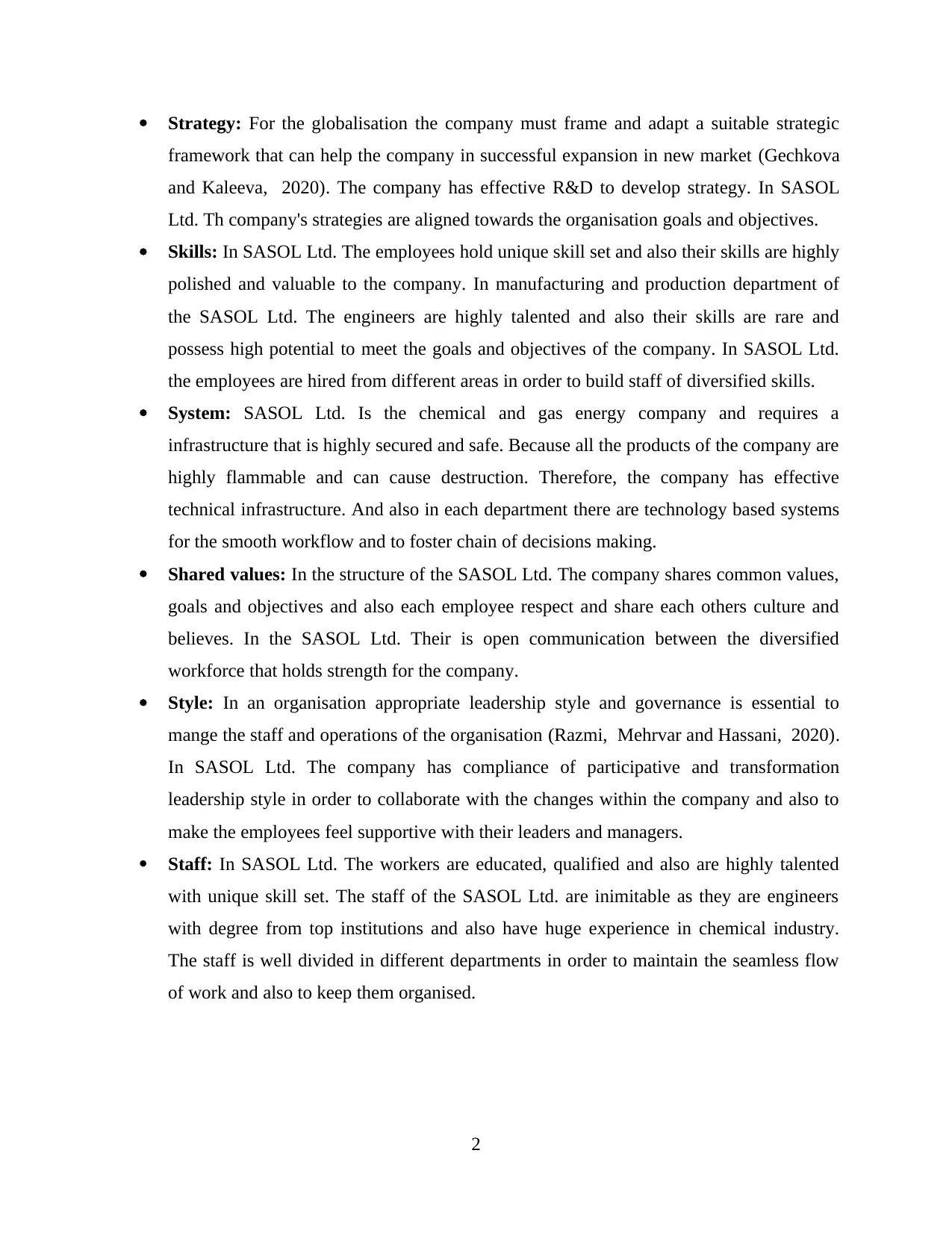
Strategy: For the globalisation the company must frame and adapt a suitable strategic
framework that can help the company in successful expansion in new market (Gechkova
and Kaleeva, 2020). The company has effective R&D to develop strategy. In SASOL
Ltd. Th company's strategies are aligned towards the organisation goals and objectives.
Skills: In SASOL Ltd. The employees hold unique skill set and also their skills are highly
polished and valuable to the company. In manufacturing and production department of
the SASOL Ltd. The engineers are highly talented and also their skills are rare and
possess high potential to meet the goals and objectives of the company. In SASOL Ltd.
the employees are hired from different areas in order to build staff of diversified skills.
System: SASOL Ltd. Is the chemical and gas energy company and requires a
infrastructure that is highly secured and safe. Because all the products of the company are
highly flammable and can cause destruction. Therefore, the company has effective
technical infrastructure. And also in each department there are technology based systems
for the smooth workflow and to foster chain of decisions making.
Shared values: In the structure of the SASOL Ltd. The company shares common values,
goals and objectives and also each employee respect and share each others culture and
believes. In the SASOL Ltd. Their is open communication between the diversified
workforce that holds strength for the company.
Style: In an organisation appropriate leadership style and governance is essential to
mange the staff and operations of the organisation (Razmi, Mehrvar and Hassani, 2020).
In SASOL Ltd. The company has compliance of participative and transformation
leadership style in order to collaborate with the changes within the company and also to
make the employees feel supportive with their leaders and managers.
Staff: In SASOL Ltd. The workers are educated, qualified and also are highly talented
with unique skill set. The staff of the SASOL Ltd. are inimitable as they are engineers
with degree from top institutions and also have huge experience in chemical industry.
The staff is well divided in different departments in order to maintain the seamless flow
of work and also to keep them organised.
2
framework that can help the company in successful expansion in new market (Gechkova
and Kaleeva, 2020). The company has effective R&D to develop strategy. In SASOL
Ltd. Th company's strategies are aligned towards the organisation goals and objectives.
Skills: In SASOL Ltd. The employees hold unique skill set and also their skills are highly
polished and valuable to the company. In manufacturing and production department of
the SASOL Ltd. The engineers are highly talented and also their skills are rare and
possess high potential to meet the goals and objectives of the company. In SASOL Ltd.
the employees are hired from different areas in order to build staff of diversified skills.
System: SASOL Ltd. Is the chemical and gas energy company and requires a
infrastructure that is highly secured and safe. Because all the products of the company are
highly flammable and can cause destruction. Therefore, the company has effective
technical infrastructure. And also in each department there are technology based systems
for the smooth workflow and to foster chain of decisions making.
Shared values: In the structure of the SASOL Ltd. The company shares common values,
goals and objectives and also each employee respect and share each others culture and
believes. In the SASOL Ltd. Their is open communication between the diversified
workforce that holds strength for the company.
Style: In an organisation appropriate leadership style and governance is essential to
mange the staff and operations of the organisation (Razmi, Mehrvar and Hassani, 2020).
In SASOL Ltd. The company has compliance of participative and transformation
leadership style in order to collaborate with the changes within the company and also to
make the employees feel supportive with their leaders and managers.
Staff: In SASOL Ltd. The workers are educated, qualified and also are highly talented
with unique skill set. The staff of the SASOL Ltd. are inimitable as they are engineers
with degree from top institutions and also have huge experience in chemical industry.
The staff is well divided in different departments in order to maintain the seamless flow
of work and also to keep them organised.
2
Secure Best Marks with AI Grader
Need help grading? Try our AI Grader for instant feedback on your assignments.
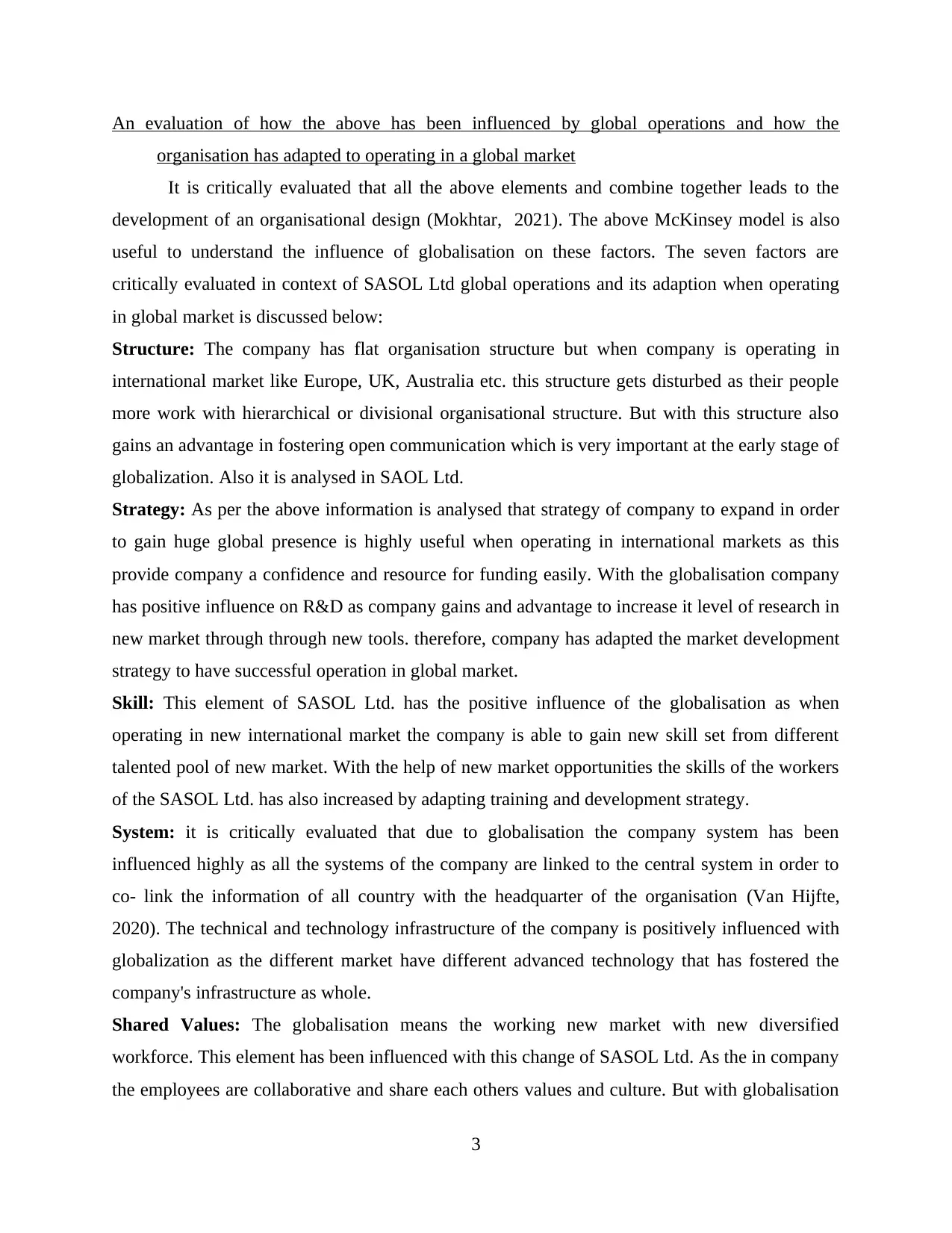
An evaluation of how the above has been influenced by global operations and how the
organisation has adapted to operating in a global market
It is critically evaluated that all the above elements and combine together leads to the
development of an organisational design (Mokhtar, 2021). The above McKinsey model is also
useful to understand the influence of globalisation on these factors. The seven factors are
critically evaluated in context of SASOL Ltd global operations and its adaption when operating
in global market is discussed below:
Structure: The company has flat organisation structure but when company is operating in
international market like Europe, UK, Australia etc. this structure gets disturbed as their people
more work with hierarchical or divisional organisational structure. But with this structure also
gains an advantage in fostering open communication which is very important at the early stage of
globalization. Also it is analysed in SAOL Ltd.
Strategy: As per the above information is analysed that strategy of company to expand in order
to gain huge global presence is highly useful when operating in international markets as this
provide company a confidence and resource for funding easily. With the globalisation company
has positive influence on R&D as company gains and advantage to increase it level of research in
new market through through new tools. therefore, company has adapted the market development
strategy to have successful operation in global market.
Skill: This element of SASOL Ltd. has the positive influence of the globalisation as when
operating in new international market the company is able to gain new skill set from different
talented pool of new market. With the help of new market opportunities the skills of the workers
of the SASOL Ltd. has also increased by adapting training and development strategy.
System: it is critically evaluated that due to globalisation the company system has been
influenced highly as all the systems of the company are linked to the central system in order to
co- link the information of all country with the headquarter of the organisation (Van Hijfte,
2020). The technical and technology infrastructure of the company is positively influenced with
globalization as the different market have different advanced technology that has fostered the
company's infrastructure as whole.
Shared Values: The globalisation means the working new market with new diversified
workforce. This element has been influenced with this change of SASOL Ltd. As the in company
the employees are collaborative and share each others values and culture. But with globalisation
3
organisation has adapted to operating in a global market
It is critically evaluated that all the above elements and combine together leads to the
development of an organisational design (Mokhtar, 2021). The above McKinsey model is also
useful to understand the influence of globalisation on these factors. The seven factors are
critically evaluated in context of SASOL Ltd global operations and its adaption when operating
in global market is discussed below:
Structure: The company has flat organisation structure but when company is operating in
international market like Europe, UK, Australia etc. this structure gets disturbed as their people
more work with hierarchical or divisional organisational structure. But with this structure also
gains an advantage in fostering open communication which is very important at the early stage of
globalization. Also it is analysed in SAOL Ltd.
Strategy: As per the above information is analysed that strategy of company to expand in order
to gain huge global presence is highly useful when operating in international markets as this
provide company a confidence and resource for funding easily. With the globalisation company
has positive influence on R&D as company gains and advantage to increase it level of research in
new market through through new tools. therefore, company has adapted the market development
strategy to have successful operation in global market.
Skill: This element of SASOL Ltd. has the positive influence of the globalisation as when
operating in new international market the company is able to gain new skill set from different
talented pool of new market. With the help of new market opportunities the skills of the workers
of the SASOL Ltd. has also increased by adapting training and development strategy.
System: it is critically evaluated that due to globalisation the company system has been
influenced highly as all the systems of the company are linked to the central system in order to
co- link the information of all country with the headquarter of the organisation (Van Hijfte,
2020). The technical and technology infrastructure of the company is positively influenced with
globalization as the different market have different advanced technology that has fostered the
company's infrastructure as whole.
Shared Values: The globalisation means the working new market with new diversified
workforce. This element has been influenced with this change of SASOL Ltd. As the in company
the employees are collaborative and share each others values and culture. But with globalisation
3
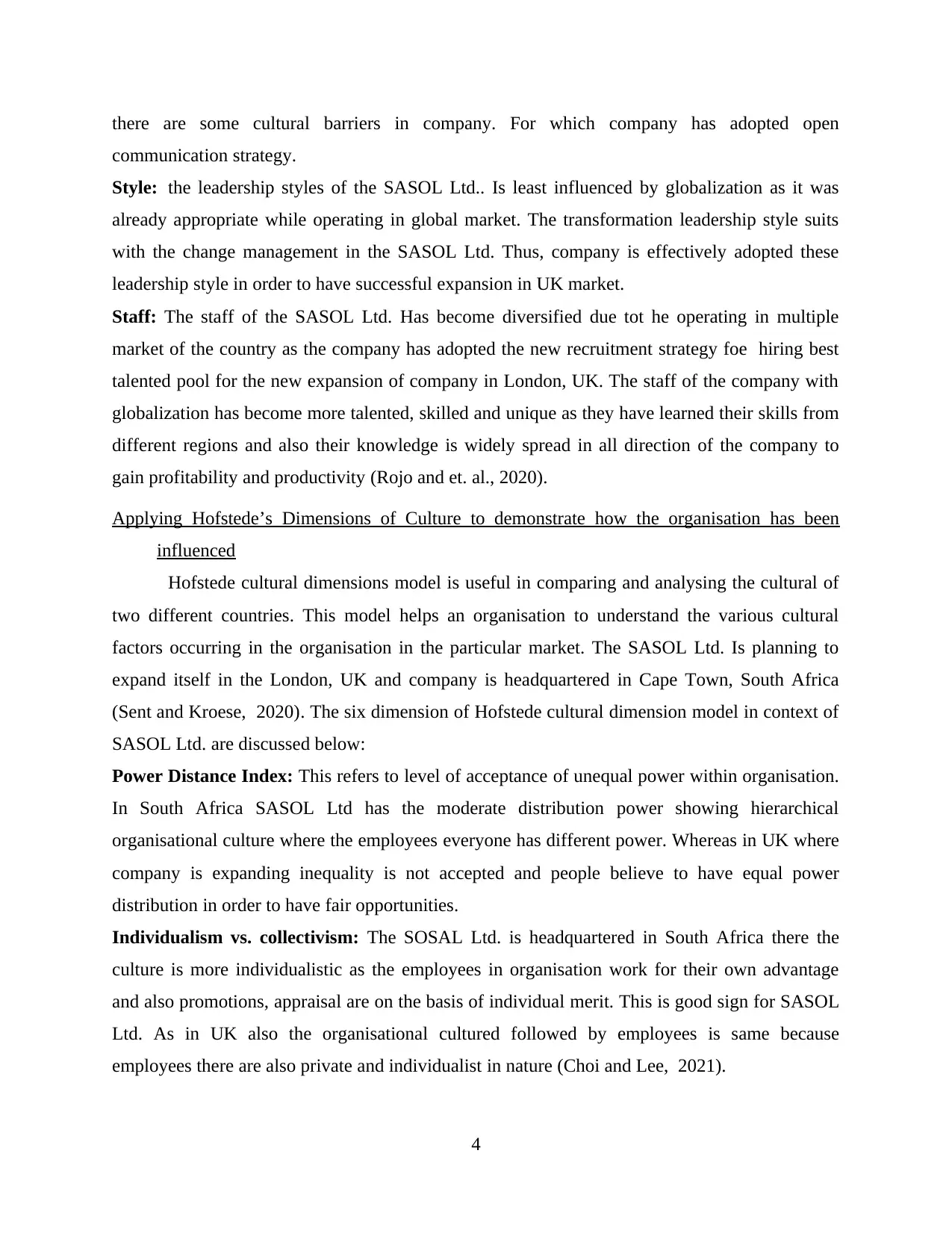
there are some cultural barriers in company. For which company has adopted open
communication strategy.
Style: the leadership styles of the SASOL Ltd.. Is least influenced by globalization as it was
already appropriate while operating in global market. The transformation leadership style suits
with the change management in the SASOL Ltd. Thus, company is effectively adopted these
leadership style in order to have successful expansion in UK market.
Staff: The staff of the SASOL Ltd. Has become diversified due tot he operating in multiple
market of the country as the company has adopted the new recruitment strategy foe hiring best
talented pool for the new expansion of company in London, UK. The staff of the company with
globalization has become more talented, skilled and unique as they have learned their skills from
different regions and also their knowledge is widely spread in all direction of the company to
gain profitability and productivity (Rojo and et. al., 2020).
Applying Hofstede’s Dimensions of Culture to demonstrate how the organisation has been
influenced
Hofstede cultural dimensions model is useful in comparing and analysing the cultural of
two different countries. This model helps an organisation to understand the various cultural
factors occurring in the organisation in the particular market. The SASOL Ltd. Is planning to
expand itself in the London, UK and company is headquartered in Cape Town, South Africa
(Sent and Kroese, 2020). The six dimension of Hofstede cultural dimension model in context of
SASOL Ltd. are discussed below:
Power Distance Index: This refers to level of acceptance of unequal power within organisation.
In South Africa SASOL Ltd has the moderate distribution power showing hierarchical
organisational culture where the employees everyone has different power. Whereas in UK where
company is expanding inequality is not accepted and people believe to have equal power
distribution in order to have fair opportunities.
Individualism vs. collectivism: The SOSAL Ltd. is headquartered in South Africa there the
culture is more individualistic as the employees in organisation work for their own advantage
and also promotions, appraisal are on the basis of individual merit. This is good sign for SASOL
Ltd. As in UK also the organisational cultured followed by employees is same because
employees there are also private and individualist in nature (Choi and Lee, 2021).
4
communication strategy.
Style: the leadership styles of the SASOL Ltd.. Is least influenced by globalization as it was
already appropriate while operating in global market. The transformation leadership style suits
with the change management in the SASOL Ltd. Thus, company is effectively adopted these
leadership style in order to have successful expansion in UK market.
Staff: The staff of the SASOL Ltd. Has become diversified due tot he operating in multiple
market of the country as the company has adopted the new recruitment strategy foe hiring best
talented pool for the new expansion of company in London, UK. The staff of the company with
globalization has become more talented, skilled and unique as they have learned their skills from
different regions and also their knowledge is widely spread in all direction of the company to
gain profitability and productivity (Rojo and et. al., 2020).
Applying Hofstede’s Dimensions of Culture to demonstrate how the organisation has been
influenced
Hofstede cultural dimensions model is useful in comparing and analysing the cultural of
two different countries. This model helps an organisation to understand the various cultural
factors occurring in the organisation in the particular market. The SASOL Ltd. Is planning to
expand itself in the London, UK and company is headquartered in Cape Town, South Africa
(Sent and Kroese, 2020). The six dimension of Hofstede cultural dimension model in context of
SASOL Ltd. are discussed below:
Power Distance Index: This refers to level of acceptance of unequal power within organisation.
In South Africa SASOL Ltd has the moderate distribution power showing hierarchical
organisational culture where the employees everyone has different power. Whereas in UK where
company is expanding inequality is not accepted and people believe to have equal power
distribution in order to have fair opportunities.
Individualism vs. collectivism: The SOSAL Ltd. is headquartered in South Africa there the
culture is more individualistic as the employees in organisation work for their own advantage
and also promotions, appraisal are on the basis of individual merit. This is good sign for SASOL
Ltd. As in UK also the organisational cultured followed by employees is same because
employees there are also private and individualist in nature (Choi and Lee, 2021).
4
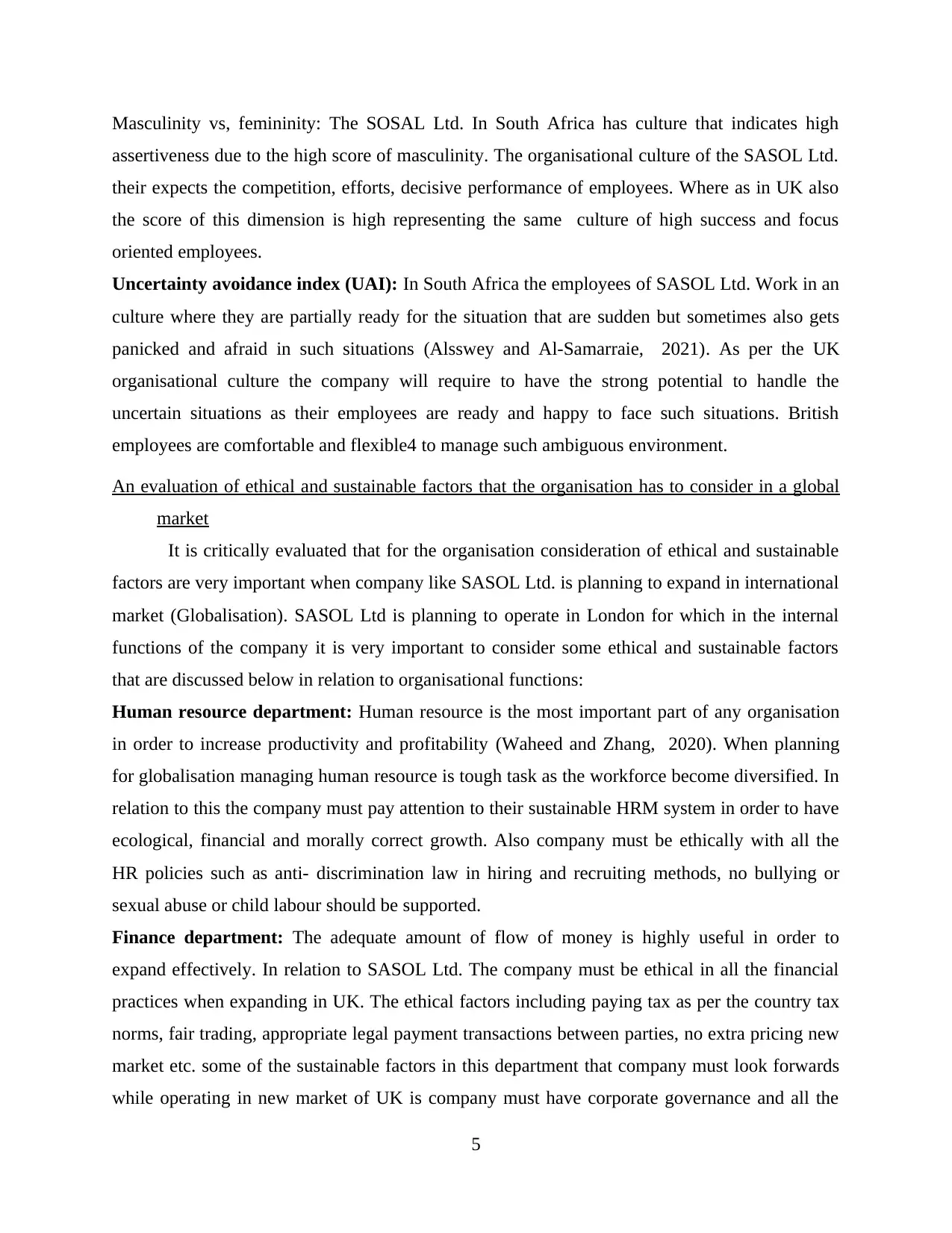
Masculinity vs, femininity: The SOSAL Ltd. In South Africa has culture that indicates high
assertiveness due to the high score of masculinity. The organisational culture of the SASOL Ltd.
their expects the competition, efforts, decisive performance of employees. Where as in UK also
the score of this dimension is high representing the same culture of high success and focus
oriented employees.
Uncertainty avoidance index (UAI): In South Africa the employees of SASOL Ltd. Work in an
culture where they are partially ready for the situation that are sudden but sometimes also gets
panicked and afraid in such situations (Alsswey and Al-Samarraie, 2021). As per the UK
organisational culture the company will require to have the strong potential to handle the
uncertain situations as their employees are ready and happy to face such situations. British
employees are comfortable and flexible4 to manage such ambiguous environment.
An evaluation of ethical and sustainable factors that the organisation has to consider in a global
market
It is critically evaluated that for the organisation consideration of ethical and sustainable
factors are very important when company like SASOL Ltd. is planning to expand in international
market (Globalisation). SASOL Ltd is planning to operate in London for which in the internal
functions of the company it is very important to consider some ethical and sustainable factors
that are discussed below in relation to organisational functions:
Human resource department: Human resource is the most important part of any organisation
in order to increase productivity and profitability (Waheed and Zhang, 2020). When planning
for globalisation managing human resource is tough task as the workforce become diversified. In
relation to this the company must pay attention to their sustainable HRM system in order to have
ecological, financial and morally correct growth. Also company must be ethically with all the
HR policies such as anti- discrimination law in hiring and recruiting methods, no bullying or
sexual abuse or child labour should be supported.
Finance department: The adequate amount of flow of money is highly useful in order to
expand effectively. In relation to SASOL Ltd. The company must be ethical in all the financial
practices when expanding in UK. The ethical factors including paying tax as per the country tax
norms, fair trading, appropriate legal payment transactions between parties, no extra pricing new
market etc. some of the sustainable factors in this department that company must look forwards
while operating in new market of UK is company must have corporate governance and all the
5
assertiveness due to the high score of masculinity. The organisational culture of the SASOL Ltd.
their expects the competition, efforts, decisive performance of employees. Where as in UK also
the score of this dimension is high representing the same culture of high success and focus
oriented employees.
Uncertainty avoidance index (UAI): In South Africa the employees of SASOL Ltd. Work in an
culture where they are partially ready for the situation that are sudden but sometimes also gets
panicked and afraid in such situations (Alsswey and Al-Samarraie, 2021). As per the UK
organisational culture the company will require to have the strong potential to handle the
uncertain situations as their employees are ready and happy to face such situations. British
employees are comfortable and flexible4 to manage such ambiguous environment.
An evaluation of ethical and sustainable factors that the organisation has to consider in a global
market
It is critically evaluated that for the organisation consideration of ethical and sustainable
factors are very important when company like SASOL Ltd. is planning to expand in international
market (Globalisation). SASOL Ltd is planning to operate in London for which in the internal
functions of the company it is very important to consider some ethical and sustainable factors
that are discussed below in relation to organisational functions:
Human resource department: Human resource is the most important part of any organisation
in order to increase productivity and profitability (Waheed and Zhang, 2020). When planning
for globalisation managing human resource is tough task as the workforce become diversified. In
relation to this the company must pay attention to their sustainable HRM system in order to have
ecological, financial and morally correct growth. Also company must be ethically with all the
HR policies such as anti- discrimination law in hiring and recruiting methods, no bullying or
sexual abuse or child labour should be supported.
Finance department: The adequate amount of flow of money is highly useful in order to
expand effectively. In relation to SASOL Ltd. The company must be ethical in all the financial
practices when expanding in UK. The ethical factors including paying tax as per the country tax
norms, fair trading, appropriate legal payment transactions between parties, no extra pricing new
market etc. some of the sustainable factors in this department that company must look forwards
while operating in new market of UK is company must have corporate governance and all the
5
Paraphrase This Document
Need a fresh take? Get an instant paraphrase of this document with our AI Paraphraser
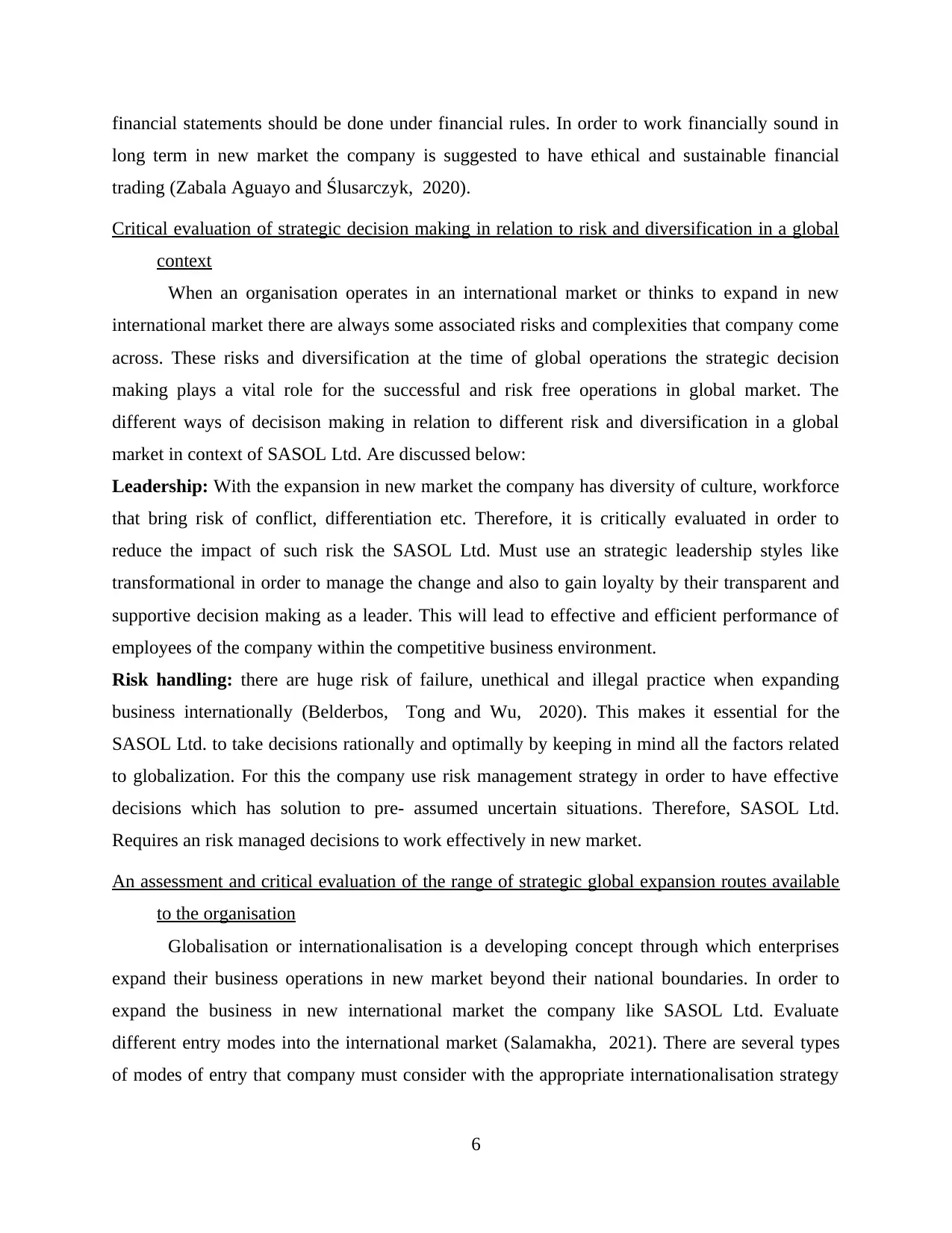
financial statements should be done under financial rules. In order to work financially sound in
long term in new market the company is suggested to have ethical and sustainable financial
trading (Zabala Aguayo and Ślusarczyk, 2020).
Critical evaluation of strategic decision making in relation to risk and diversification in a global
context
When an organisation operates in an international market or thinks to expand in new
international market there are always some associated risks and complexities that company come
across. These risks and diversification at the time of global operations the strategic decision
making plays a vital role for the successful and risk free operations in global market. The
different ways of decisison making in relation to different risk and diversification in a global
market in context of SASOL Ltd. Are discussed below:
Leadership: With the expansion in new market the company has diversity of culture, workforce
that bring risk of conflict, differentiation etc. Therefore, it is critically evaluated in order to
reduce the impact of such risk the SASOL Ltd. Must use an strategic leadership styles like
transformational in order to manage the change and also to gain loyalty by their transparent and
supportive decision making as a leader. This will lead to effective and efficient performance of
employees of the company within the competitive business environment.
Risk handling: there are huge risk of failure, unethical and illegal practice when expanding
business internationally (Belderbos, Tong and Wu, 2020). This makes it essential for the
SASOL Ltd. to take decisions rationally and optimally by keeping in mind all the factors related
to globalization. For this the company use risk management strategy in order to have effective
decisions which has solution to pre- assumed uncertain situations. Therefore, SASOL Ltd.
Requires an risk managed decisions to work effectively in new market.
An assessment and critical evaluation of the range of strategic global expansion routes available
to the organisation
Globalisation or internationalisation is a developing concept through which enterprises
expand their business operations in new market beyond their national boundaries. In order to
expand the business in new international market the company like SASOL Ltd. Evaluate
different entry modes into the international market (Salamakha, 2021). There are several types
of modes of entry that company must consider with the appropriate internationalisation strategy
6
long term in new market the company is suggested to have ethical and sustainable financial
trading (Zabala Aguayo and Ślusarczyk, 2020).
Critical evaluation of strategic decision making in relation to risk and diversification in a global
context
When an organisation operates in an international market or thinks to expand in new
international market there are always some associated risks and complexities that company come
across. These risks and diversification at the time of global operations the strategic decision
making plays a vital role for the successful and risk free operations in global market. The
different ways of decisison making in relation to different risk and diversification in a global
market in context of SASOL Ltd. Are discussed below:
Leadership: With the expansion in new market the company has diversity of culture, workforce
that bring risk of conflict, differentiation etc. Therefore, it is critically evaluated in order to
reduce the impact of such risk the SASOL Ltd. Must use an strategic leadership styles like
transformational in order to manage the change and also to gain loyalty by their transparent and
supportive decision making as a leader. This will lead to effective and efficient performance of
employees of the company within the competitive business environment.
Risk handling: there are huge risk of failure, unethical and illegal practice when expanding
business internationally (Belderbos, Tong and Wu, 2020). This makes it essential for the
SASOL Ltd. to take decisions rationally and optimally by keeping in mind all the factors related
to globalization. For this the company use risk management strategy in order to have effective
decisions which has solution to pre- assumed uncertain situations. Therefore, SASOL Ltd.
Requires an risk managed decisions to work effectively in new market.
An assessment and critical evaluation of the range of strategic global expansion routes available
to the organisation
Globalisation or internationalisation is a developing concept through which enterprises
expand their business operations in new market beyond their national boundaries. In order to
expand the business in new international market the company like SASOL Ltd. Evaluate
different entry modes into the international market (Salamakha, 2021). There are several types
of modes of entry that company must consider with the appropriate internationalisation strategy
6
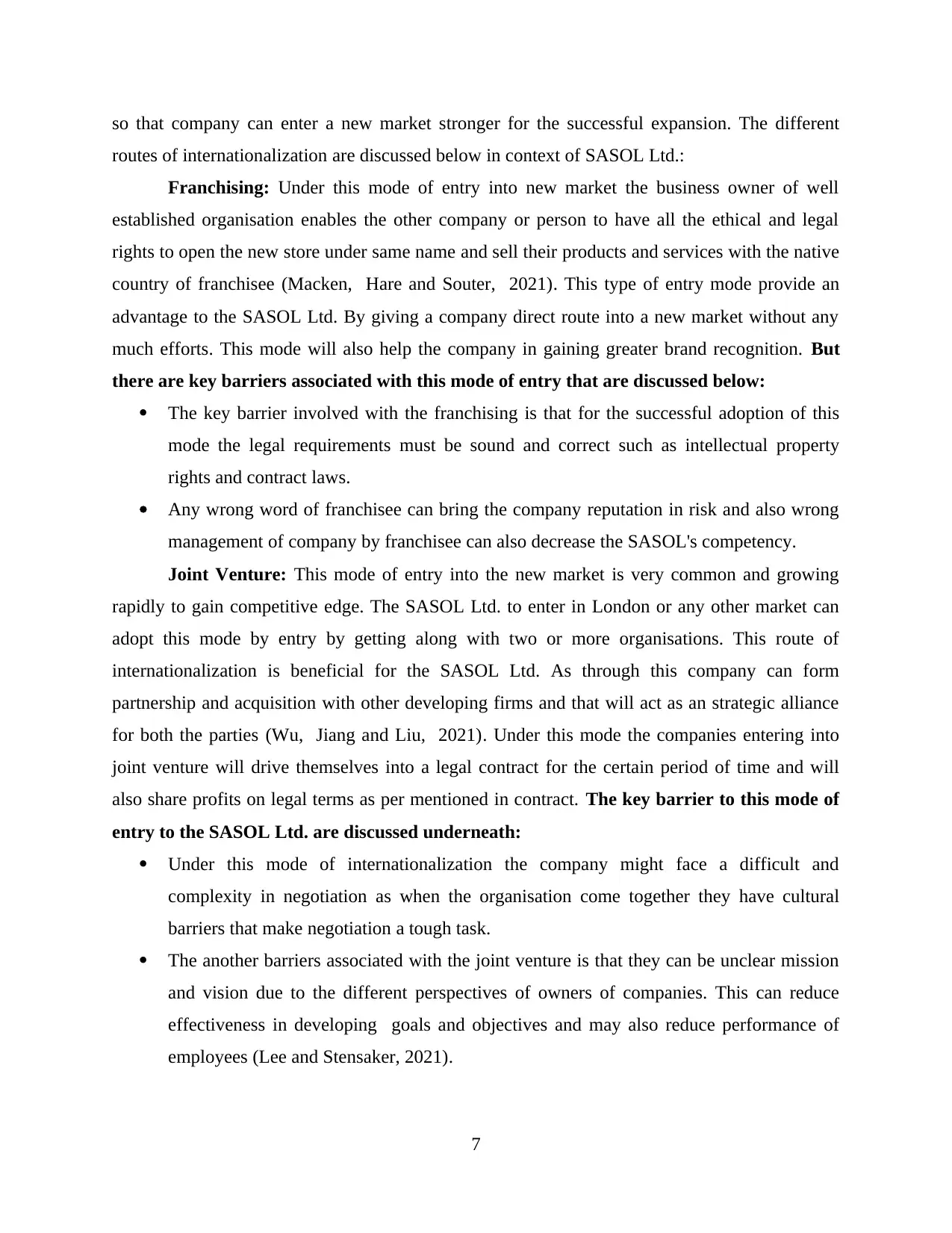
so that company can enter a new market stronger for the successful expansion. The different
routes of internationalization are discussed below in context of SASOL Ltd.:
Franchising: Under this mode of entry into new market the business owner of well
established organisation enables the other company or person to have all the ethical and legal
rights to open the new store under same name and sell their products and services with the native
country of franchisee (Macken, Hare and Souter, 2021). This type of entry mode provide an
advantage to the SASOL Ltd. By giving a company direct route into a new market without any
much efforts. This mode will also help the company in gaining greater brand recognition. But
there are key barriers associated with this mode of entry that are discussed below:
The key barrier involved with the franchising is that for the successful adoption of this
mode the legal requirements must be sound and correct such as intellectual property
rights and contract laws.
Any wrong word of franchisee can bring the company reputation in risk and also wrong
management of company by franchisee can also decrease the SASOL's competency.
Joint Venture: This mode of entry into the new market is very common and growing
rapidly to gain competitive edge. The SASOL Ltd. to enter in London or any other market can
adopt this mode by entry by getting along with two or more organisations. This route of
internationalization is beneficial for the SASOL Ltd. As through this company can form
partnership and acquisition with other developing firms and that will act as an strategic alliance
for both the parties (Wu, Jiang and Liu, 2021). Under this mode the companies entering into
joint venture will drive themselves into a legal contract for the certain period of time and will
also share profits on legal terms as per mentioned in contract. The key barrier to this mode of
entry to the SASOL Ltd. are discussed underneath:
Under this mode of internationalization the company might face a difficult and
complexity in negotiation as when the organisation come together they have cultural
barriers that make negotiation a tough task.
The another barriers associated with the joint venture is that they can be unclear mission
and vision due to the different perspectives of owners of companies. This can reduce
effectiveness in developing goals and objectives and may also reduce performance of
employees (Lee and Stensaker, 2021).
7
routes of internationalization are discussed below in context of SASOL Ltd.:
Franchising: Under this mode of entry into new market the business owner of well
established organisation enables the other company or person to have all the ethical and legal
rights to open the new store under same name and sell their products and services with the native
country of franchisee (Macken, Hare and Souter, 2021). This type of entry mode provide an
advantage to the SASOL Ltd. By giving a company direct route into a new market without any
much efforts. This mode will also help the company in gaining greater brand recognition. But
there are key barriers associated with this mode of entry that are discussed below:
The key barrier involved with the franchising is that for the successful adoption of this
mode the legal requirements must be sound and correct such as intellectual property
rights and contract laws.
Any wrong word of franchisee can bring the company reputation in risk and also wrong
management of company by franchisee can also decrease the SASOL's competency.
Joint Venture: This mode of entry into the new market is very common and growing
rapidly to gain competitive edge. The SASOL Ltd. to enter in London or any other market can
adopt this mode by entry by getting along with two or more organisations. This route of
internationalization is beneficial for the SASOL Ltd. As through this company can form
partnership and acquisition with other developing firms and that will act as an strategic alliance
for both the parties (Wu, Jiang and Liu, 2021). Under this mode the companies entering into
joint venture will drive themselves into a legal contract for the certain period of time and will
also share profits on legal terms as per mentioned in contract. The key barrier to this mode of
entry to the SASOL Ltd. are discussed underneath:
Under this mode of internationalization the company might face a difficult and
complexity in negotiation as when the organisation come together they have cultural
barriers that make negotiation a tough task.
The another barriers associated with the joint venture is that they can be unclear mission
and vision due to the different perspectives of owners of companies. This can reduce
effectiveness in developing goals and objectives and may also reduce performance of
employees (Lee and Stensaker, 2021).
7
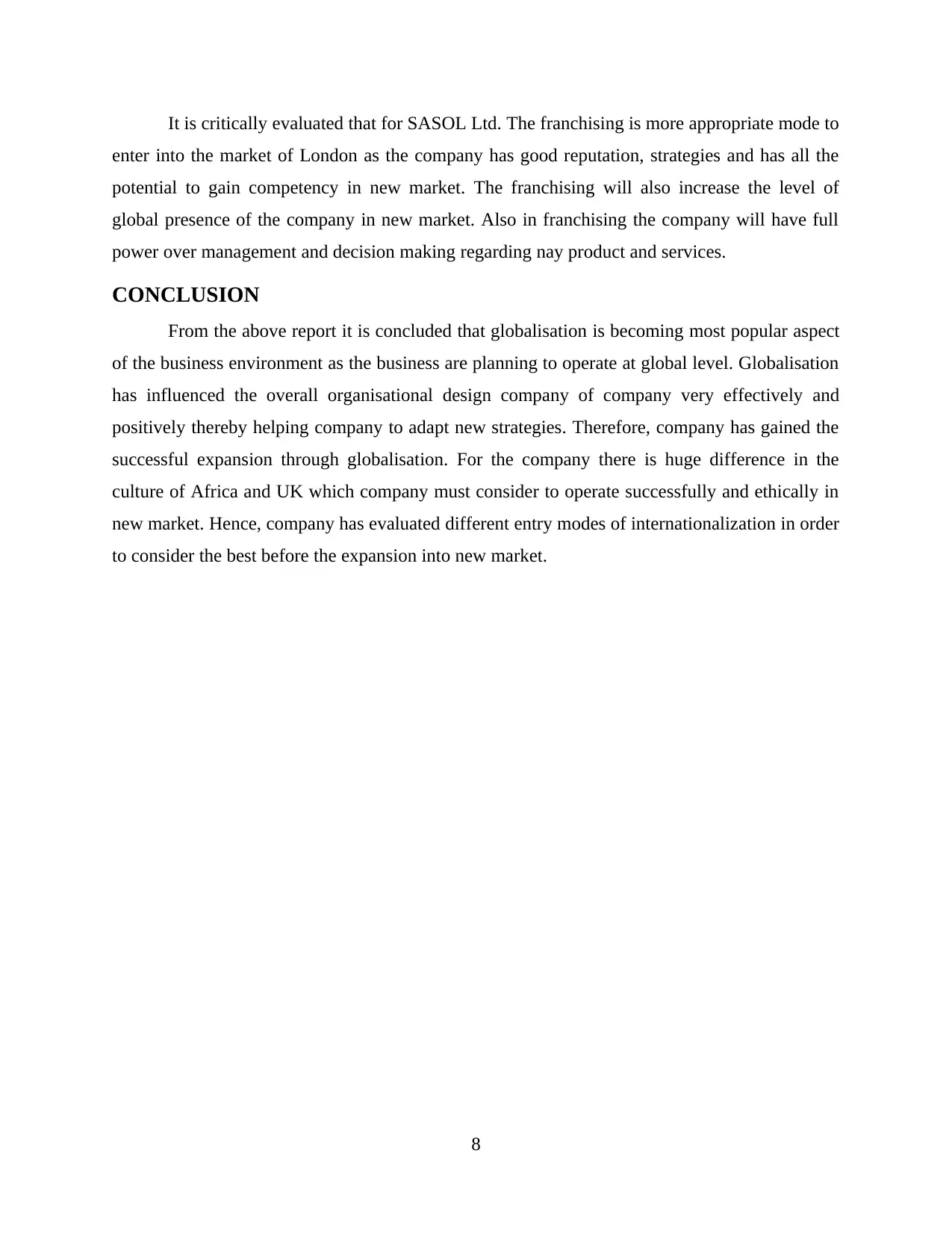
It is critically evaluated that for SASOL Ltd. The franchising is more appropriate mode to
enter into the market of London as the company has good reputation, strategies and has all the
potential to gain competency in new market. The franchising will also increase the level of
global presence of the company in new market. Also in franchising the company will have full
power over management and decision making regarding nay product and services.
CONCLUSION
From the above report it is concluded that globalisation is becoming most popular aspect
of the business environment as the business are planning to operate at global level. Globalisation
has influenced the overall organisational design company of company very effectively and
positively thereby helping company to adapt new strategies. Therefore, company has gained the
successful expansion through globalisation. For the company there is huge difference in the
culture of Africa and UK which company must consider to operate successfully and ethically in
new market. Hence, company has evaluated different entry modes of internationalization in order
to consider the best before the expansion into new market.
8
enter into the market of London as the company has good reputation, strategies and has all the
potential to gain competency in new market. The franchising will also increase the level of
global presence of the company in new market. Also in franchising the company will have full
power over management and decision making regarding nay product and services.
CONCLUSION
From the above report it is concluded that globalisation is becoming most popular aspect
of the business environment as the business are planning to operate at global level. Globalisation
has influenced the overall organisational design company of company very effectively and
positively thereby helping company to adapt new strategies. Therefore, company has gained the
successful expansion through globalisation. For the company there is huge difference in the
culture of Africa and UK which company must consider to operate successfully and ethically in
new market. Hence, company has evaluated different entry modes of internationalization in order
to consider the best before the expansion into new market.
8
Secure Best Marks with AI Grader
Need help grading? Try our AI Grader for instant feedback on your assignments.
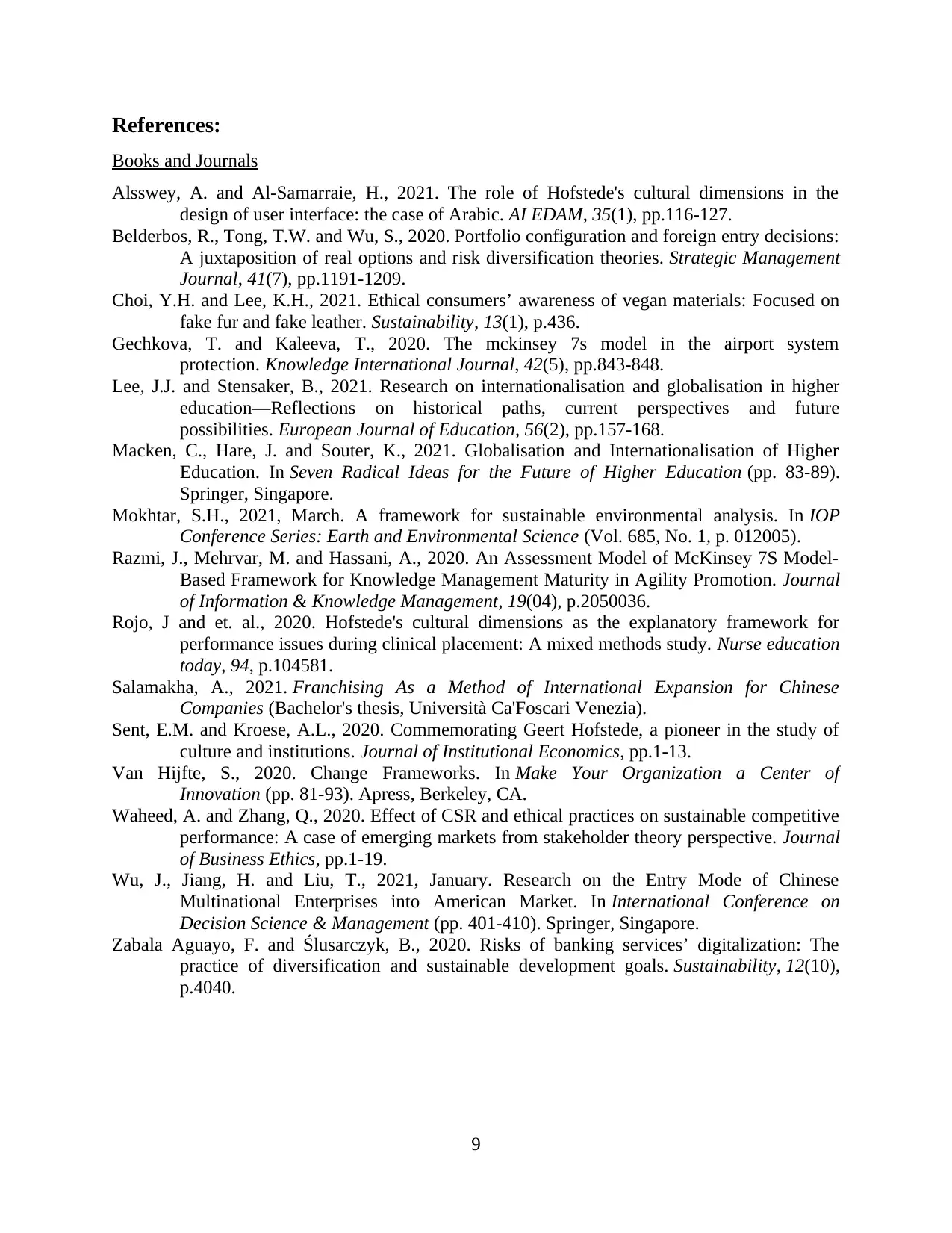
References:
Books and Journals
Alsswey, A. and Al-Samarraie, H., 2021. The role of Hofstede's cultural dimensions in the
design of user interface: the case of Arabic. AI EDAM, 35(1), pp.116-127.
Belderbos, R., Tong, T.W. and Wu, S., 2020. Portfolio configuration and foreign entry decisions:
A juxtaposition of real options and risk diversification theories. Strategic Management
Journal, 41(7), pp.1191-1209.
Choi, Y.H. and Lee, K.H., 2021. Ethical consumers’ awareness of vegan materials: Focused on
fake fur and fake leather. Sustainability, 13(1), p.436.
Gechkova, T. and Kaleeva, T., 2020. The mckinsey 7s model in the airport system
protection. Knowledge International Journal, 42(5), pp.843-848.
Lee, J.J. and Stensaker, B., 2021. Research on internationalisation and globalisation in higher
education—Reflections on historical paths, current perspectives and future
possibilities. European Journal of Education, 56(2), pp.157-168.
Macken, C., Hare, J. and Souter, K., 2021. Globalisation and Internationalisation of Higher
Education. In Seven Radical Ideas for the Future of Higher Education (pp. 83-89).
Springer, Singapore.
Mokhtar, S.H., 2021, March. A framework for sustainable environmental analysis. In IOP
Conference Series: Earth and Environmental Science (Vol. 685, No. 1, p. 012005).
Razmi, J., Mehrvar, M. and Hassani, A., 2020. An Assessment Model of McKinsey 7S Model-
Based Framework for Knowledge Management Maturity in Agility Promotion. Journal
of Information & Knowledge Management, 19(04), p.2050036.
Rojo, J and et. al., 2020. Hofstede's cultural dimensions as the explanatory framework for
performance issues during clinical placement: A mixed methods study. Nurse education
today, 94, p.104581.
Salamakha, A., 2021. Franchising As a Method of International Expansion for Chinese
Companies (Bachelor's thesis, Università Ca'Foscari Venezia).
Sent, E.M. and Kroese, A.L., 2020. Commemorating Geert Hofstede, a pioneer in the study of
culture and institutions. Journal of Institutional Economics, pp.1-13.
Van Hijfte, S., 2020. Change Frameworks. In Make Your Organization a Center of
Innovation (pp. 81-93). Apress, Berkeley, CA.
Waheed, A. and Zhang, Q., 2020. Effect of CSR and ethical practices on sustainable competitive
performance: A case of emerging markets from stakeholder theory perspective. Journal
of Business Ethics, pp.1-19.
Wu, J., Jiang, H. and Liu, T., 2021, January. Research on the Entry Mode of Chinese
Multinational Enterprises into American Market. In International Conference on
Decision Science & Management (pp. 401-410). Springer, Singapore.
Zabala Aguayo, F. and Ślusarczyk, B., 2020. Risks of banking services’ digitalization: The
practice of diversification and sustainable development goals. Sustainability, 12(10),
p.4040.
9
Books and Journals
Alsswey, A. and Al-Samarraie, H., 2021. The role of Hofstede's cultural dimensions in the
design of user interface: the case of Arabic. AI EDAM, 35(1), pp.116-127.
Belderbos, R., Tong, T.W. and Wu, S., 2020. Portfolio configuration and foreign entry decisions:
A juxtaposition of real options and risk diversification theories. Strategic Management
Journal, 41(7), pp.1191-1209.
Choi, Y.H. and Lee, K.H., 2021. Ethical consumers’ awareness of vegan materials: Focused on
fake fur and fake leather. Sustainability, 13(1), p.436.
Gechkova, T. and Kaleeva, T., 2020. The mckinsey 7s model in the airport system
protection. Knowledge International Journal, 42(5), pp.843-848.
Lee, J.J. and Stensaker, B., 2021. Research on internationalisation and globalisation in higher
education—Reflections on historical paths, current perspectives and future
possibilities. European Journal of Education, 56(2), pp.157-168.
Macken, C., Hare, J. and Souter, K., 2021. Globalisation and Internationalisation of Higher
Education. In Seven Radical Ideas for the Future of Higher Education (pp. 83-89).
Springer, Singapore.
Mokhtar, S.H., 2021, March. A framework for sustainable environmental analysis. In IOP
Conference Series: Earth and Environmental Science (Vol. 685, No. 1, p. 012005).
Razmi, J., Mehrvar, M. and Hassani, A., 2020. An Assessment Model of McKinsey 7S Model-
Based Framework for Knowledge Management Maturity in Agility Promotion. Journal
of Information & Knowledge Management, 19(04), p.2050036.
Rojo, J and et. al., 2020. Hofstede's cultural dimensions as the explanatory framework for
performance issues during clinical placement: A mixed methods study. Nurse education
today, 94, p.104581.
Salamakha, A., 2021. Franchising As a Method of International Expansion for Chinese
Companies (Bachelor's thesis, Università Ca'Foscari Venezia).
Sent, E.M. and Kroese, A.L., 2020. Commemorating Geert Hofstede, a pioneer in the study of
culture and institutions. Journal of Institutional Economics, pp.1-13.
Van Hijfte, S., 2020. Change Frameworks. In Make Your Organization a Center of
Innovation (pp. 81-93). Apress, Berkeley, CA.
Waheed, A. and Zhang, Q., 2020. Effect of CSR and ethical practices on sustainable competitive
performance: A case of emerging markets from stakeholder theory perspective. Journal
of Business Ethics, pp.1-19.
Wu, J., Jiang, H. and Liu, T., 2021, January. Research on the Entry Mode of Chinese
Multinational Enterprises into American Market. In International Conference on
Decision Science & Management (pp. 401-410). Springer, Singapore.
Zabala Aguayo, F. and Ślusarczyk, B., 2020. Risks of banking services’ digitalization: The
practice of diversification and sustainable development goals. Sustainability, 12(10),
p.4040.
9
1 out of 11
Related Documents
Your All-in-One AI-Powered Toolkit for Academic Success.
+13062052269
info@desklib.com
Available 24*7 on WhatsApp / Email
![[object Object]](/_next/static/media/star-bottom.7253800d.svg)
Unlock your academic potential
© 2024 | Zucol Services PVT LTD | All rights reserved.


